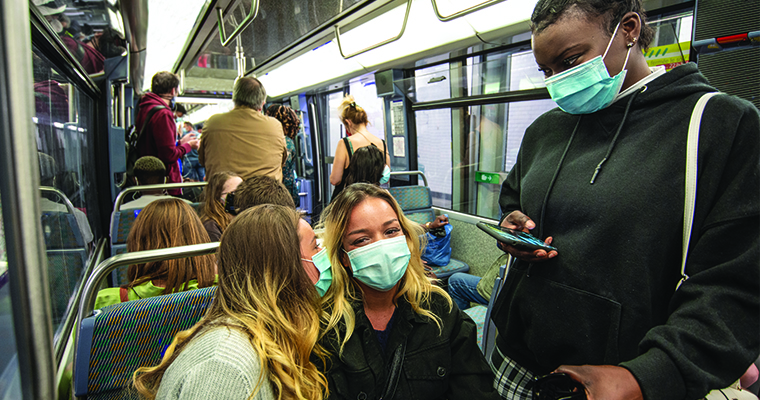Research Team Releases Third Report on Living in Boston During COVID-19
UMass Boston researchers have released a third report in a series on the effects of COVID-19 on Boston residents as part of a National Science Foundation research grant awarded to a partnership among the Boston Area Research Initiative (BARI) at Northeastern University, the Center for Survey Research (CSR) at the University of Massachusetts Boston, and the Boston Public Health Commission (BPHC). This latest report reveals a range of inequities in how different populations have experienced financial disadvantage due to the pandemic.

The multi-report research project is based on a survey conducted in the summer of 2020 that asked 1,626 Bostonians about their experiences during the first months of the COVID-19 pandemic, including their ability and tendency to follow social distancing recommendations, attitudes toward regulations, and the economic and personal impacts of the pandemic.
The report, entitled Living in Boston During COVID-19: Economic Strain and written by UMass Boston Professor of Sociology Russell Schutt and Interim Director of the Center for Survey Research Lee Hargraves, describes how the pandemic has affected the employment trajectories and economic resources of Boston’s residents, examining how these impacts were distributed by race and ethnicity, socioeconomic status, and family composition.
The study found that more than four in ten of Boston’s residents experienced an adverse economic impact of the pandemic by the time of the survey, including:
- About one-quarter of those working just before the pandemic spent some time not working after it began, but seven percent returned to work by the summer.
- About one in five of all respondents reported their personal income had declined “a lot,” while another one in five reported their income had declined a little.
- Only seven percent reported that their personal income had gone up during the pandemic.
The report also found that those who lost income reported much higher levels of economic vulnerability, including low levels of savings and more worries about finances, and there were stark differences in these experiences in relation to sociodemographic characteristics.
- Reports of income loss during the pandemic were more common among respondents reporting lower income levels, with those with no more than an 8th grade education being twice as likely to have lost income as those with a graduate degree.
- Latinx, Asian, and Black residents were much more likely to have lost income than white respondents and those who identified with more than one racial group. Among Latinx respondents in neighborhoods with a high ethnic concentration, those who responded in Spanish were most likely to have lost a lot of income.
- Single parents were more likely to have lost income than others.
There were also stark differences in economic impact among Boston’s neighborhoods.
- Few residents in affluent communities suffered a major loss of income, while many of those is the poorest communities lost a lot of income.
- In some communities of color, between one-third and one-half of residents were worried about running out of money for food.
In summary, notes Professor Schutt of UMass Boston, “the economic pain resulting from the pandemic impacted almost half of Boston’s residents, but those effects varied dramatically between neighborhoods and across social groups in a way that exacerbated existing inequities and so requires policy responses that are targeted as well as intensive.”
The first report, Inequalities in Navigating a Pandemic, highlighted how some Bostonians were able to alter their daily activities to minimize their exposure to risk and maximize their health, whereas others were not—showing stark disparities by race and income in who had to go to work, how people accessed food, and who was riding transit and exercising.
The second report, Fear and Ambivalence, describes the attitudes and behaviors that might create vulnerabilities for spreading infection in different communities.
The series of reports is intended to provide public officials, community leaders, and decision-makers a resource to understand the impacts of COVID-19 across the city, and to especially understand how and why the pandemic has hit historically marginalized communities the hardest. This information is crucial at this time as cases again spike.
Additional, upcoming reports will focus on areas such as the impact of economic strains due to the pandemic on exposure to risk of infection, who will get the vaccine, and health in Boston.
The UMass Boston research team also includes Floyd (Jack) Fowler, a senior research fellow at the Center for Survey Research; Anthony Roman, a senior research fellow at the Center for Survey Research; Hannah Grabowski, a research assistant and student in the Graduate Program in Applied Sociology; and Nikola Kovacevic, assistant study director in the Center for Survey Research.
